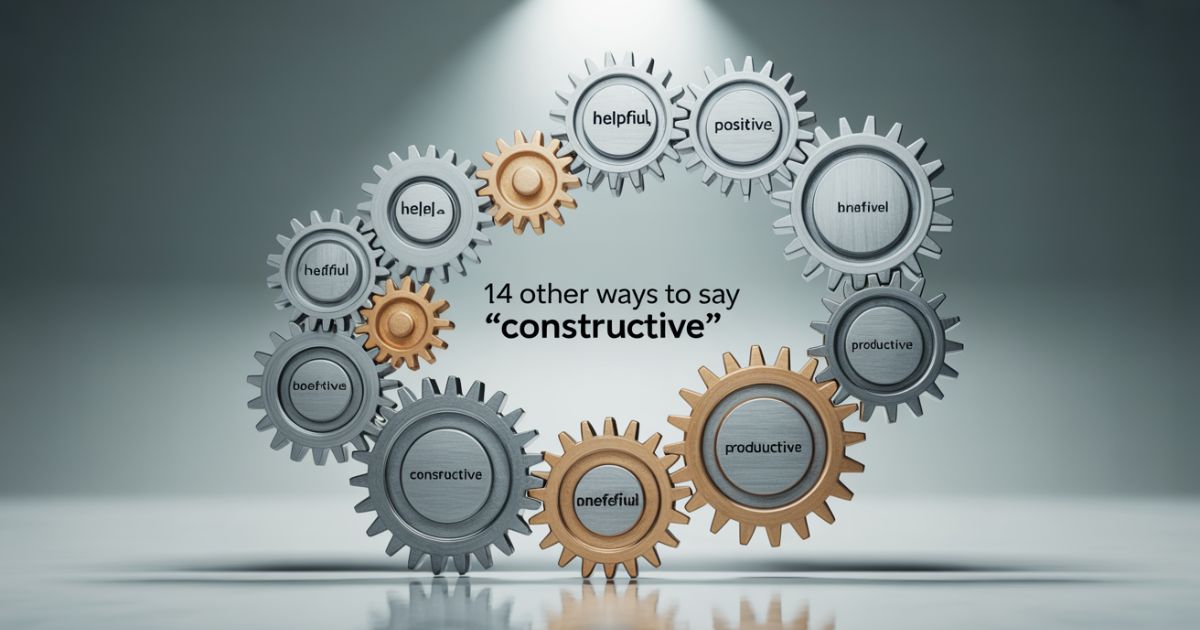When we say something is constructive, we mean it’s helpful, not hurtful. Constructive words or feedback aim to support growth. They guide someone in a way that helps, not harms. In work or school, being constructive builds trust and improvement. A constructive attitude encourages learning and change. Whether you’re giving advice or sharing thoughts, being constructive shows you care.
Using the right words to replace constructive can improve how we connect with others. This article shares 14 other ways to say constructive. These options keep your message clear and kind. Learning new ways to sound constructive can make your communication better, stronger, and more respectful in every situation.
- Supportive: Promotes growth by creating a safe space for open dialogue and collaboration.
- Encouraging: Boosts motivation and confidence while gently guiding individuals toward improvement.
- Helpful: Offers practical, actionable suggestions that clarify next steps for personal or professional progress.
- Positive: Reinforces strengths and cultivates an optimistic mindset that sees challenges as opportunities.
- Insightful: Delivers deeper understanding by revealing patterns, offering perspective, and inspiring thoughtful reflection.
- Productive: Drives meaningful results through focused effort, clear direction, and constructive dialogue.
- Developmental: Focuses on advancing personal and professional journeys, encouraging exploration and resilience in overcoming challenges.
Supportive is a warm and caring word. It’s great when you want to show someone that you’re on their side. A supportive comment helps people feel safe, respected, and open to new ideas. For example, if someone is struggling with a project, supportive feedback encourages them to keep going while gently guiding them in the right direction.
In team environments or personal growth situations, being supportive creates trust. People are more likely to grow when they know someone believes in their potential. So when you want to build confidence while offering advice, this word works beautifully.
When someone is doing something new or difficult, being encouraging can make a huge difference. This word shows that you believe in someone’s ability to improve. Encouraging feedback gives people energy to keep trying, even when things feel hard.
Use this word when your main goal is to uplift someone while still giving honest input. Instead of pointing out everything that’s wrong, focus on what’s working and what could be better. That’s how you make people feel strong and supported while helping them grow.
This one’s simple but powerful. Helpful feedback is practical, focused, and meant to guide someone toward a better outcome. It doesn’t just say what went wrong, it gives clear steps on how to fix it.
In work settings or learning situations, being helpful builds trust and respect. People appreciate advice that’s easy to understand and use. If your comments are making a real difference, then they’re more than just constructive, they’re helpful.

Sometimes people think giving feedback means focusing only on mistakes. But positive feedback changes that view. It highlights what’s going well and offers gentle ideas for improvement. It’s about building people up instead of tearing them down.
Using positive language helps keep people motivated. It makes them more likely to listen, learn, and grow. So next time you want to say something constructive, think about whether a positive tone might work even better.
The word insightful goes a step deeper. It means your feedback shows a strong understanding of a situation. Insightful comments offer new ways of thinking or reveal something others might not have noticed.
This kind of feedback is great when you’re giving advice to someone who needs to reflect or grow. Use it when you want to help someone think critically and make smarter decisions. When you say something insightful, people feel like they’ve truly learned something valuable.
Looking for even more ways to say constructive? Think about your intention: Are you trying to inspire, teach, or support? Based on your goal, you might choose a different word to express yourself clearly and kindly. Keep reading to explore even more powerful alternatives.
When ideas lead to action, they’re productive. This word works well in meetings, group projects, or discussions that aim to get real results. A productive conversation isn’t just pleasant, it moves things forward.
Use this when your feedback helps people solve problems, build solutions, or make progress. It signals that your words aren’t just smart, they’re useful. And that’s a key part of being constructive.
Beneficial means your advice is helpful in the long run. It improves the situation, even if the change doesn’t happen right away. This word is great when you’re offering feedback that helps someone grow over time.
It’s also a polite way to suggest change. Saying something is beneficial shows that you care about the outcome. It can make people more open to listening and learning because they know you have their best interest in mind.
When your main goal is to educate or explain, use the word informative. This kind of feedback shares facts, points out patterns, or adds knowledge that helps people understand better.
An informative message doesn’t judge, it guides. It focuses on what people need to know to do better next time. Whether in a classroom or a boardroom, informative language makes your ideas clear and effective.
Read More: 12 Other Ways to Say “Constructively”
If you want your feedback to open someone’s mind, call it enlightening. This word means your message shines a light on something new, maybe something the other person hadn’t considered.
When people walk away from a conversation feeling wiser, you’ve given enlightening feedback. It’s powerful, positive, and deeply respectful. This kind of communication often leads to real change because it touches both the mind and the heart.
Sometimes feedback needs to calm fears, not stir them up. That’s when reassuring words work best. They remind someone that they’re doing okay and that improvement is part of the process.
When you’re trying to motivate without overwhelming, say something reassuring. It helps people feel safe enough to take risks and make changes. It’s soft, kind, and still constructive.

Developmental feedback is long-term. It doesn’t just fix what’s wrong now, it helps someone grow over time. This term is great in professional and academic settings where continuous improvement matters.
Using developmental feedback shows you understand the big picture. You’re not just pointing out flaws, you’re helping someone build skills, confidence, and resilience.
If your feedback makes someone feel good and ready to improve, it’s uplifting. This kind of feedback celebrates success while gently pushing toward more.
Being uplifting is important in coaching, leadership, or any situation where morale matters. It brings joy and energy into your communication, which leads to better outcomes and stronger relationships.
Affirmative feedback focuses on what’s working. It gives people a sense of progress and success. You’re saying, “Keep doing that, it’s great.”
It also adds a layer of encouragement and empowerment. If you want to reinforce good habits or build someone’s confidence, being affirmative is more effective than being neutral.
Sometimes, people don’t need answers, they need direction. That’s when guiding feedback works well. It offers gentle suggestions without taking away someone’s freedom to choose.
Being guiding shows that you respect the person’s ability to make decisions. You’re helping them discover the best path forward, which is one of the highest forms of constructive communication.
There are many ways to sound constructive without using the same word again and again. Words like supportive, encouraging, and insightful can help you sound more clear and kind. These words still show your goal is to help, not to hurt. Being constructive means you want someone to grow and do better.
Using different words helps your message feel fresh and real. It also shows you care about how you speak. Always choose words that match your tone. Use these words when giving feedback or sharing ideas. They must sound constructive, honest, and helpful. A constructive voice builds trust, brings respect, and makes communication stronger for everyone.

Grammarbeam is a smart language assistant built for clarity, creativity, and precision. From polishing grammar to exploring rich synonyms and refining sentence structure, Grammarbeam is your go-to tool for powerful communication. If you’re writing for school, business, or just for fun — let your words shine with Grammarbeam.

